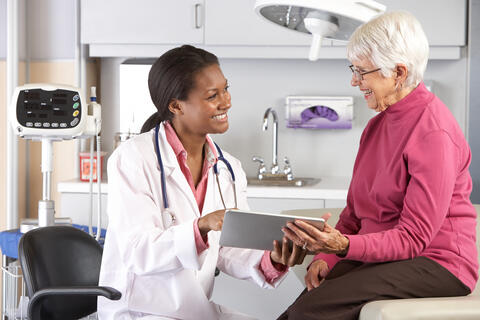Healthcare-Associated Infections: Information for Patients and Families
Germs are everywhere, especially in health care settings. Sometimes while receiving medical treatments and procedures these germs can cause infections. These are called healthcare-associated infections (HAIs).
You could get an HAI anywhere you receive health care, including hospitals, outpatient clinics, dialysis centers, nursing homes, and assisted living facilities. Germs can spread between patients, on unwashed hands of health care staff, through improper cleaning, and more.
There are steps you can take to help prevent the spread of germs and lower your risk of getting an HAI. This page contains tips and resources for patients, residents of long-term care facilities, and their families.
How can I prevent getting an HAI?
If you are a patient, or if you are providing care to a friend or family member, follow these steps to prevent HAIs.
Wash your hands
Wash your hands often and make sure your family members and friends do as well. Read the Wash Your Hands!, P-01710 fact sheet for instructions on how to properly wash your hands (available in multiple languages).
If you do not see your health care provider clean their hands before providing care, speak up and ask them to do so.
Take antibiotics only when necessary
Only take antibiotics if they are prescribed to you by a health care provider, and if prescribed, take the antibiotic exactly as directed. Antibiotics can save lives, but it’s important to use them safely and only as needed. Learn more about safe antibiotic use.
Watch for signs and symptoms infection
If you have recently received a medical treatment or procedure, watch for signs or symptoms of infection. These could include redness, swelling, and fever. If you have signs or symptoms of infection, seek medical care immediately. If left untreated, an infection could lead to sepsis.
Keep wounds and dressings clean
Always make sure you clean your hands before and after caring for your wound. Don't let family and friends who visit you touch the wound or dressings unless they are caring for you. If you have signs of infection such as discharge of pus from your wound, seek medical care immediately.
Keep your environment clean
If you are in a hospital or long-term care facility, allow environmental services workers to clean your room when needed. If you are at home or caring for someone at home, clean the area, especially high-touched surfaces, often.
Talk to a health care provider
Ask your health care provider what specific steps you can take to prevent an infection before, during, and after your visit or procedure.
Take other steps to stay healthy
- Incorporate physical activity and a healthy diet into your daily life.
- Do not smoke.
- Stay up to date with vaccinations such as the flu vaccine.
Read Stay Healthy and Prevent HAIs for Patients, Residents, and Families, P-03729c (PDF) to learn more about HAIs.
Multidrug-resistant organisms
Multidrug-resistant organisms (MDROs) are germs, primarily bacteria, that are resistant to antibiotics or other drugs that are meant to control them. This means that infections caused by MDROs can be very difficult to treat. Some people are at higher risk for MDRO infections including those:
- Who frequently receive medical treatments or procedures.
- Who reside in a long-term care facility.
- With open wounds.
- With weakened immune systems or chronic health conditions.
Read the MDRO Fact Sheet for Residents and Families, P-03148 (PDF) to learn more about MDROs.
Handy hygiene tips
We all have a part to play when it comes to preventing the spread of germs, including those that cause HAIs. Practicing good hygiene is one of the best ways to protect ourselves and others.
Learn more by watching the show, Handy Hygiene Tips, hosted by Wally VandeHand.
Other patient, resident, and family resources
- Infection Prevention and You webpage: Infection prevention information for patients and families from the Association for Professionals in Infection Control and Epidemiology
- Tips for Being a Safe Patient webpage: Find tips and resources for being a safe patient from the CDC (Centers for Disease Control and Prevention).
- For information and data on HAIs in specific health care facilities, read the Wisconsin Hospital Association CheckPoint® consumer resources and the Centers for Medicare & Medicaid Services Care Compare website.
Questions about HAIs? Contact us
Phone: 608-267-7711 | Fax: 608-261-4976


